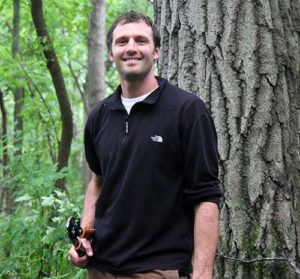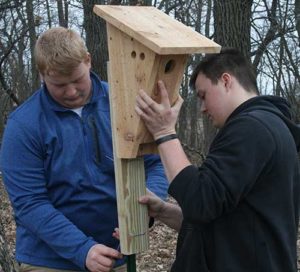WAUKESHA — The Schoenstatt Retreat Center could easily be mistaken for a state park. Apart from a couple buildings and a chapel, the center’s campus is entirely green.
Hundreds of acres of farmland, woodland and prairie surround the buildings. Gently sloping hills mark the movements of glaciers tens of thousands of years ago. Schoenstatt, German for “beautiful place,” lives up to its name. The land has a simple, profound elegance.

A science teacher at Marquette University High School, Milwaukee, Joe Meyer founded the Laudato Si’ Project to combine two of his passions: nature and faith. (Catholic Herald photo by Jacob Scobey-Polacheck)
Though the center is owned and staffed by the Schoenstatt Sisters of Mary, they are not alone in their stewardship of the land. Marquette University High School teacher Joe Meyer founded the Laudato Si’ Project this past February. He and the project’s board of directors have joined the sisters in calling the retreat center their inspiration and workspace.
The project, inspired by Pope Francis’ 2015 encyclical “Laudato Si’,” promotes the growth of environmental appreciation and caretaking within the Catholic community. It aims to bring the pope’s ideas to fruition — for individuals and for organizations.
The venture is new, but Meyer said it only came to be because of two passions he has had for a long time: nature and faith. For years, he struggled to find a way for his love of science and God to intersect.
“In the secular world, they’re telling you to separate the two,” he said. “I prayed a lot about finding that integration.”
In addition to prayer, Meyer studied the work of church leaders, reading texts from St. Francis of Assisi, St. John Paul II, Pope Benedict XVI and others. But it was Pope Francis’ encyclical that finally gave him the clarity and inspiration he needed.
“When I really dove into the teaching, I realized the church feels the same way I do, in its authentic, true self,” he said. “The way I was feeling about my passion for the natural world doesn’t at all compete with this love for God. In fact, it complements it perfectly.”[su_pullquote align=”right”]“Our insistence that each human being is an image of God should not make us overlook the fact that each creature has its own purpose. None is superfluous. The entire material universe speaks of God’s love, his boundless affection for us. Soil, water, mountains: everything is, as it were, a caress of God.”
— Pope Francis, Laudato Si’
[/su_pullquote]
Pope Francis published the nearly 200-page “Laudato Si’” in June 2015. It is an appeal from the Holy Father for an inclusive dialogue about environmental challenges the planet is facing and how those issues can be overcome. He argues that every person is morally obligated to act.
Meyer took this call to action to heart, gathering a diverse, passionate staff of volunteers to help him bring the mission of care for God’s creation to anyone willing to partake. These volunteers do service work at the retreat center, as well as elsewhere.
The group also helps create and strengthen environmental groups in schools and parishes. Its work is only limited by the inspiration of the encyclical and three pillars: education, stewardship and recreation.[su_pullquote align=”right”]To support the Laudato Si’ Project through volunteering, membership or sponsoring projects, contact executive director Joe Meyer, (262) 308-6641 or email laudatosiproject@gmail.com[/su_pullquote]
Education, especially, is at the core of their work, through sharing the contents of the encyclical as well the practical teaching of how to be a steward of the Earth.
The board often works with Meyer’s environmental science course and a student-founded outdoors homeroom at Marquette, and it is also a partner with St. Thomas More High School and various parishes.
Education of these students is a key aspect of their mission. The project’s website explains with a quote from Senegalese forestry engineer Baba Dioum: “In the end we will conserve only what we love; we will love only what we understand; and we will understand only what we are taught.”
Volunteer groups have finished several stewardship projects through Meyer’s program during the past few months. They have installed wooden nest boxes for bluebirds and cleared trails for retreatants at the ecology center, worked on beach restoration, removed invasive species, and volunteered at the Urban Ecology Center and land trusts and preserves.
Meyer said finding willing volunteers is never a large issue.
“Generally, there’s a desire in people to do these sorts of things. Sometimes they don’t understand how to do it, and that’s where we come in,” he said.
Often, the team does not need to create an activity for a parish or group, but rather it can support and strengthen an existing initiative. Or, as the group’s influence grows, Meyer and the board can direct people to other environmental groups and events in the Milwaukee area.
The recreation aspect of the project’s mission is a reminder that appreciating nature does not have to be a chore. Meyer said that just taking a few minutes every day to appreciate some green space can help create higher environmental consciousness. The group has led hikes and snowshoeing events and keeps members updated on other outdoor events.
The reception from volunteers has been positive. Some high schoolers have told Meyer that the project opened their eyes to a new direction for their lives that they had never considered.
As exceptional as it is to change a life, Meyer finds the smaller changes to be equally rewarding. Every slight lifestyle change and new parish membership is a sign the Laudato Si’ Project is having success on a macro level. He sees his role as basic, but potentially instrumental in someone’s life.

Patrick Donohue, left, and Jonathon Wallace, students at Marquette University High School, Milwaukee, install a wooden nest box for bluebirds on the grounds of the Schoenstatt Retreat Center, Waukesha, in late spring. (Submitted photo courtesy Joe Meyer)
“It’s giving people that have that spark – that interest – this whole new world that they didn’t even know existed,” he said. “Where we’re starting is trying to mobilize people within the church to see us as stewards of the environment.”
The Schoenstatt Sisters of Mary are proud to host the undertaking.
“Pope Francis has given our church and the whole world a valuable impulse through ‘Laudato Si’, and it’s wonderful to have something like the Laudato Si’ Project to help us implement those impulses in a practical and effective way,” Sr. M. Joanna Buckley said.
Meyer hopes to see even more growth. The board has an interest in creating permanent positions and in eventually being able to have a high school or college student intern. There are plenty of project ideas, but they need more members, volunteers and sponsors to be able to execute them.
Meyer is careful to keep his priorities in check. In the end, his goal is to help Catholics be the moral beacon that Pope Francis exemplifies.
He and his team also seek to pull people to Christ.
“Ultimately, that’s the goal. Not just to have people cut down buckthorn on the weekend – it’s to draw them to God,” he said.
Nonetheless, Meyer continues to cut down the invasive trees. His second passion is always at play to complement his faith. With dozens of volunteers at his side, he tirelessly works to remove the obstacles, lay down wood chips and create a path to a more sustainable world.
